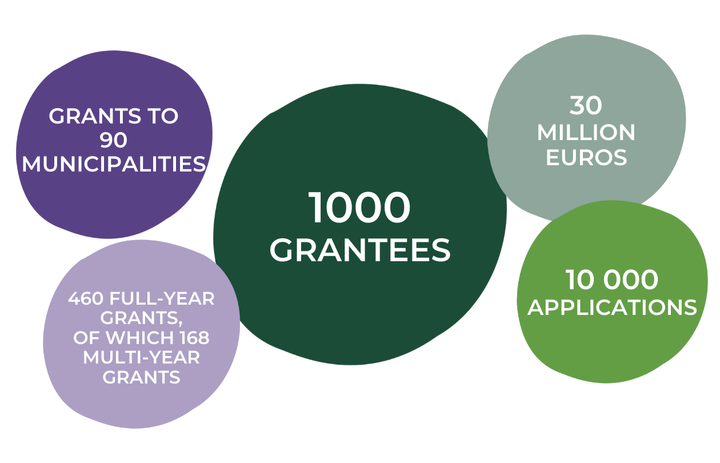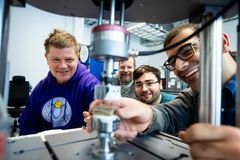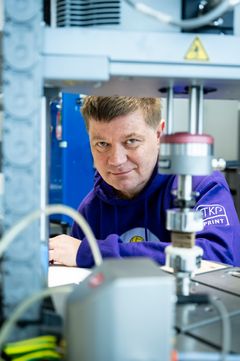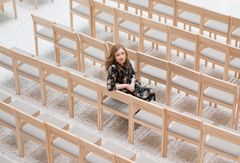More than 30 million euros given to support science, the arts, and culture
A thousand researchers, artists, and projects have received support for their work from the Finnish Cultural Foundation. The grants will strengthen a sustainable, pluralistic, and diverse Finland.

As a result of its application round in October 2023, the Finnish Cultural Foundation has awarded grants totalling over 30 million euros to support science, the arts, and culture. The foundation gives out more than 50 million euros annually, making it one of the largest grant-making foundations in Finland.
“We want to take responsibility for the opportunities to make and experience science, the arts, and culture in the entire country,” says Susanna Petterson, CEO of the Finnish Cultural Foundation. “This time, the grant money was spread across 90 municipalities and 1,000 researchers, artists, and projects. By strengthening science and art, we build a sustainable, pluralistic, and diverse society.”
The October application round marks the first time the foundation received over 10,000 applications. One in 10 applications was awarded a grant. The applications are reviewed by a diverse group of over 150 experts in a range of scientific and artistic fields. The members of the group change from year to year.
In the October round, 43% of the grant money was directed to the arts and 57% to science. The larger percentage of funds allocated to science reflects the interest of the majority of the foundation’s donors in providing support to scientific fields.
The need for support particularly for artistic work has grown steadily in recent years.
“Art received almost 13 million euros worth of support from the Finnish Cultural Foundation. Grants that provide for full-time work are immensely important for artists, as their work requires persistence and concentration,” Pettersson says. “Together with foundations, public funders must ensure that artists continue to have an opportunity to focus on creative work.”
The largest grants in science were awarded to research supporting Finland’s competitiveness in industry and business. Aalto University professors Harri Lipsanen and Zhipei Sun and their team were given 250,000 euros for their work developing neuromorphic electronic components that imitate the structure and function of the human brain. The scientists are striving to find new, more environmentally friendly technological solutions.
Another major grant, of 242,000 euros, was awarded to Doctor of Theology Sini Mikkola and her team at the University of Eastern Finland to study norms, expectations, and ideals of manhood in a Lutheran context from the Reformation to the first decades of the 20th century. Their research is of particular interest at a time when the changing nature of masculinity is being discussed in the media, the church, and politics.
Full-time grants provide continuity
The foundation awards a large number of grants that allow grantees to work on science or art full-time. In this round, 460 full-year grants were awarded, of which 168 were multi-year grants.
Four-year grants will be used to study a wide range of topics, including: the visual politics of far-left online communities in the US (MA Jaakko Dickman), a method for measuring cancer stem cells in patient samples, (PhD Nikolaos Giannareas), the practices of hope and utopia (PhD Teemu Paavolainen), poetics in the late works of L. Onerva (MA Susanna Selve), and how transgenderism is represented in liberal Russian media (MA Alisa Virtanen). Documentary film director and screenwriter Anu Kuivalainen also received a four-year grant for her work.
The Kirpilä Art Collection research grant is intended for postdoc research related to art collecting, collectors’ collections, home museums, or artists who feature in the Kirpilä Art Collection. MA Elina Sairanen was awarded this four-year research grant for studying Finnish art museums founded by private collectors from the 1880s to the 2020s.
Three-year grants were awarded, for example, for the study of: the streaming format as an environment in which young people construct their identities (MFA Harri Homi), the experiences of people with disabilities transitioning to working life (MA Kia Liimatainen), and employing gamification techniques to promote sustainable behaviours among citizens (MSc Naghmeh Mohammadpourlima). Three-year grants for artistic work were awarded to author Tiina Laitila Kälvemark, illustrator and visual artist Aino Louhi, drama translator Reita Lounatvuori, visual artist Joel Slotte, sculptor and performance artist Mimosa Pale, and circus artist Sasu Peistola.
Information for a wide audience
The Finnish Cultural Foundation also gave approximately 900,000 euros toward the production of non-fiction books on a variety of topics in science and art. This support has a direct impact on work opportunities in the field.
“Non-fiction literature struggles with a lack of funding. We want to do our part to ensure that publishing high-quality non-fiction in Finnish will continue to be possible,” says Susanna Pettersson. “We need more critical discussion and curiosity towards the world, which is what non-fiction literature represents.”
Heidi Airaksinen and Tiina Tuppurainen will write about Finnish queer history, and Susanne Dahlgren and Mikko Lohikoski are working on a book regarding changing power politics in the Middle East. Katariina Parhi and Vesa Ranta will focus on the history of workhouses, and Mika Rokka is writing about endangered butterfly species. Sonja Saarikoski will look at classical music from the perspective of women, and Lassi Karhu is making a podcast popularising cyber security.
Tiede tutuksi (Getting to know science) grants focusing on children and young people were awarded to 12 projects, amounting to a total of over 800,000 euros.
The foundation’s 25,000-euro Eminentia grants are given to leaders in scientific or artistic fields to help them reflect on their life’s work in written form. This round’s grants were awarded to dance artist and choreographer Alpo Aaltokoski, former leader of the National Library of Finland Kai Ekholm, dance artist Marja Korhola, painter and graphic artist Inari Krohn, former professor of film editing at Aalto University Anne Lakanen, visual artist Jarmo Mäkilä, and costume designer and scenographer Pirjo Valinen.
Encounters, experiences, and interactions
The number of Romani speakers in Finland has decreased significantly, and the language has become endangered. In 2022, the Finnish Cultural Foundation decided to spend up to a million euros by 2030 to support Finnish Romani language and culture. The support will consist primarily of grants, and the first 10 were awarded in this round.
MA Mirkka Salo will use her grant to study metalanguage in online conversations regarding the Romani language by Finnish Romani people, and MMus Anette Åkerlund is writing a book of poetry in Romani. Various grants were awarded to develop Romani learning materials and to further language revitalisation work.
Several grantees aim to increase the understanding of the immigrant experience in Finland. The work of MSc Bayan Bilal Ahmad Arouri examines the reimagining of violence and peace in Syrian refugee communities in Finland and Jordan, MA Akhgar Kaboli researches the future outlook for young refugee adults living in Finland, and MSc Yasemin Kontkanen looks into the entrepreneurship of immigrant women in Finland.
Support was also directed to Sámi languages and culture. Essi Morottaja and team Čuovvâd were given a grant of 90,000 euros for a children’s music project to develop Sámi early music education and create new materials for music pedagogy in all three Sámi languages spoken in Finland. Architect Eveliina Sarapää received a grant to establish a consortium of Sámi architects, which is intended to start a discussion in Finland regarding Sámi architecture and construction in Sápmi.
“The Finnish Cultural Foundation has long been active in protecting minority languages and cultures. As a foundation of and for the whole of Finland, we are responsible not only for endangered cultural capital, but also the inclusivity of culture and art,” notes Susanna Pettersson.
The foundation also provides Taidetta kaikille (Art for all) grants to increase the opportunities for people in need of support or care to experience high-quality art. A total of 460,000 euros was awarded to 12 projects.
AI is changing the world
In recent years, various artificial intelligence (AI) applications have come into everyday use. Many grant applicants hope to explore the opportunities offered by AI and understand its consequences.
One of the largest grants this year was given to Aalto University professor Mikko Alava and his team. They received 200,000 euros to develop waterproof foams that can be used to replace plastic. The study utilises biomimetics, mimicking the structure of wood with the help of AI-based methods.
Other AI-focused grants were awarded to: law professor at the University of Helsinki Anette Alén and her team to research the changes in preconditions and interests in the creative industry and its business models in the age of digitalisation and artificial intelligence; MA Liisa Petäinen to study new AI-based methods in cancer diagnostics; and DSocSc Heikki Wilenius to examine the interaction between developers and AI, and the resulting overall changes in their work.
Keywords
Contacts
Susanna PetterssonCEOSuomen Kulttuurirahasto
susanna.pettersson@skr.fiJuhana LassilaDirector of Cultural AffairsSuomen Kulttuurirahasto
Tel:09 6128 1230juhana.lassila@skr.fiReeta HolmaCommunications ManagerSuomen Kulttuurirahasto
Tel:09 6128 1233reeta.holma@skr.fiImages




Links
The Finnish Cultural Foundation is a private foundation that supports science, the arts, and culture by awarding grants from a central fund and 17 regional funds. It also works for Finnish culture by launching and implementing projects with partners. The foundation's assets are based on donations received over the last more than 80 years.
Subscribe to releases from Suomen Kulttuurirahasto
Subscribe to all the latest releases from Suomen Kulttuurirahasto by registering your e-mail address below. You can unsubscribe at any time.
Latest releases from Suomen Kulttuurirahasto
Taiteen ja kulttuurin rahoitusleikkaukset vaikuttavat kaikkialla Suomessa – tuore katsaus tarkentaa kuvaa valtion tuen muutoksista30.6.2025 11:00:00 EEST | Tiedote
Millaisia vaikutuksia taiteen ja kulttuurin rahoitusleikkauksilla on alan toimijoihin ja tapahtumiin eri puolilla Suomea? Suomen Kulttuurirahaston tilaamassa katsauksessa vertaillaan valtionavustustietoja vuoden 2023 ja vuoden 2025 kevään välillä erityisesti alueellisesta näkökulmasta.
Tampereen sananvapaustapahtumassa puhutaan Yhdysvalloista ja vapauden merkityksestä18.6.2025 05:00:00 EEST | Tiedote
Syyskuisen Tampereen sananvapaustapahtuman puhujavieraaksi tulee amerikkalaisessa ja globaalissa uutismediassa uraa uurtanut päätoimittaja Kathleen Carroll. Toista kertaa järjestettävän keskustelufoorumin teemana on ”Yhdysvallat – mitä vapaus merkitsee”.
Saamelaiset museoesineet palaavat kotiin –saamelaisyhteisöjen kanssa tehtävä palautustyö sai 850 000 euron tuen9.6.2025 09:59:00 EEST | Tiedote
Saamelaismuseo Siidan yhteisöllinen hanke selvittää, miten kotiin palautuneet saamelaisesineet tulevat parhaiten osaksi elävää saamelaiskulttuuria. Rahoitus jatkaa Suomen Kulttuurirahaston pitkäjänteistä tukea saamelaiskulttuurille ja saamen kielille.
Kulttuurirahasto jatkaa tukeaan soittajalupauksille – 320 000 euroa puupuhallinakatemialle4.6.2025 07:00:00 EEST | Tiedote
Suomen Kulttuurirahasto myönsi 320 000 euron rahoituksen valtakunnallisen puupuhallinakatemian perustamiseen ja toimintaan. Akatemia tarjoaa varhaisen vaiheen lisäkoulutusta nuorille soittajalahjakkuuksille.
Kulttuurirahaston residenssiohjelma laajenee Nigerian Lagosiin ja Lontooseen28.5.2025 06:22:00 EEST | Tiedote
Suomen Kulttuurirahasto rakentaa taiteilijoiden kansainvälistä liikkuvuutta Euroopan laajimpiin kuuluvan residenssiohjelman kautta. Uusia kohteita ovat Nigerian Lagosissa sijaitseva G. A. S. -residenssi sekä ACME Lontoossa.
In our pressroom you can read all our latest releases, find our press contacts, images, documents and other relevant information about us.
Visit our pressroom